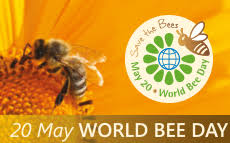
Adapting, Collaborating, and Not Hoarding
All the health authorities are telling us the same thing: stay home and don’t hoard food. My bees get the stay-at-home part but missed the memo on hoarding.
Bees are innately programmed to stay home and eat after they detect a danger in their immediate environment. Dangerous smoke and the threat of a fire triggers a feeding response. When bees sense smoke they begin gorging inordinate amounts of their stored honey, since fleeing may be inevitable. If they need to find a new home they’ll have to start building, and it takes eight pounds of honey to make one pound of wax. So they start consuming honey like crazy, which is why we smoke the hive before going in to tend to the bees. Just like when we humans eat too much it makes us lethargic and content, too much honey makes bees lethargic and content and less likely to sting. I don’t know about you but you, but I have found myself digging into our pantry a bit more than I normally do this past month and that feeling of lethargy has been creeping in. Don’t copy your bees’ actions on the hoarding front though. Bees are natural hoarders, in good years packing away far more honey than they need.
As we work our way through this crisis, we need to focus more on how the bees collaborate with one another for the greater good of the hive. We should reflect on how they have survived for millions of years by adapting to change. Something tells me that some big changes are in store for us as we transition to the new normal.
Finally, the act of beekeeping in many ways is a socially isolating pastime. It’s often time spent alone but not really alone as you observe the thousands upon thousands of amazing creatures and how they adapt to all the curve balls that Mother Nature has thrown them over millions of years.
The least we can do now is socially isolate, and try not to get stung by this virus.
